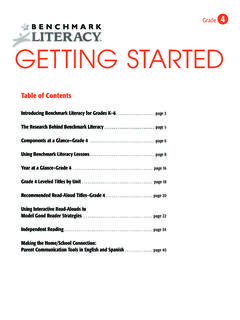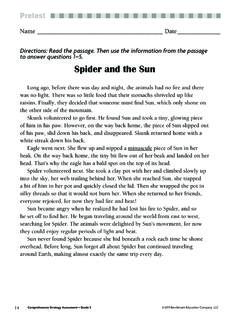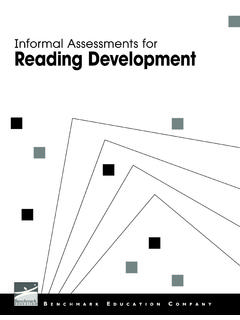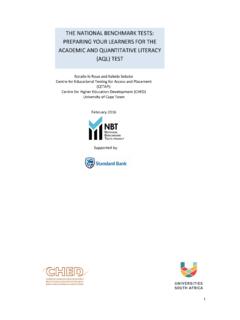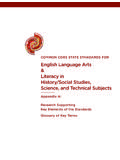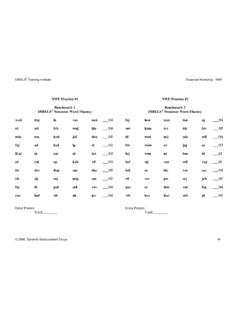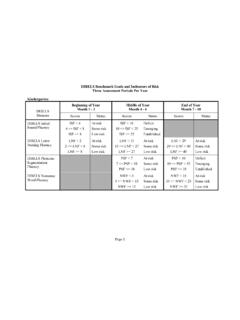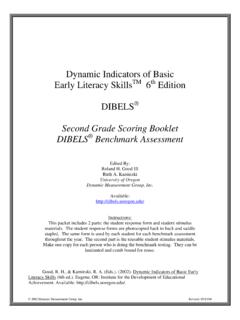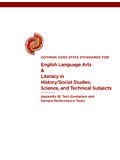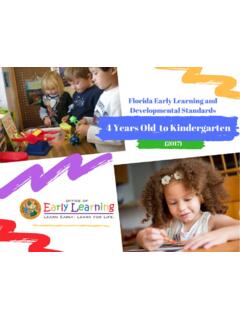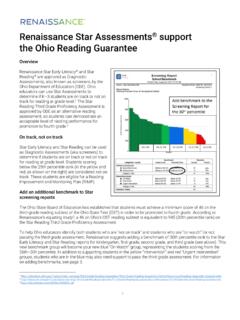Transcription of Informal Assessments for Text Comprehension
1 Informal Assessments for Text Comprehension benchmark Education Company 629 Fifth Avenue Pelham, NY 10803. Copyright 2011 benchmark Education Company, LLC. All rights reserved. Teachers may photocopy the reproducible Assessments in this book for classroom use. No other part of this publication may be reproduced or transmitted in whole or in part in any form or by any means, electronic or mechanical, including photocopy, recording, or any information storage or retrieval system, without permission in writing from the publisher. Printed in the USA. ISBN: 978-1-4509-2882-3. For ordering information, call Toll-Free 1-877-236-2465 or visit our Web site: Informal Table of Contents Assessments Section One: Overview for Text Assessment Comprehension benchmark Education Company Scheduling, Managing, Organizing, and Storing Observations and Responsive What Research Says About Comprehension 10.
2 Section Two: Supporting Metacognitive Strategy Development Observing Metacognitive Strategy 12. Section Three: Supporting Comprehension Strategy Development Observing Comprehension Strategy 24. Graphic Comprehension Through Deductive Reasoning Observation Retelling Assessments and 45. Writing Assessment Section Four: Reading Conferences Conference Note-Taking Prompting to Support Comprehension Strategy Section One: Ov erv iew Assessment Introduction Daily teaching goes hand in hand with ongoing assessment and evaluation. The wide variety of reading, writing, spelling, and language Assessments provided by benchmark Education Company enables teachers to: obtain multiple perspectives on the literacy growth occurring in their classrooms;. monitor and reflect on their teaching and students' learning.
3 Make informed decisions about students' progress and needs;. select appropriate materials and instructional techniques that match students' current level of development;. document progress over time through a cumulative portfolio;. report progress to students, parents, and administrators. Meaningful, ongoing, and multifaceted observation is the heart of the evaluation process. Since observations must occur in authentic contexts, utilize your small-group reading time to document students' efforts to join discussions; ask and answer questions; react to prompts; contribute ideas for graphic organizers;. process text; problem-solve new words; apply targeted skills and strategies, and act out and/or talk, draw, or write about books. The integration of assessment, teaching, and learning supports effective literacy instruction.
4 benchmark Education Company provides teachers with the tools for understanding and documenting literacy development. Teachers can use this information to differentiate instruction by developmental reading behaviors and characteristics, metacognitive and Comprehension strategy needs, instructional reading levels, fluency, and vocabulary understandings. 1. Use pre- and post- Assessments to inform instruction. 8. Provide intervention, 2. Plan for instruction. if necessary. 7. Provide additional support for the Assessment, Teaching, 3. Model the strategy. and Learning Cycle targeted strategy. 6. Monitor student 4. Practice the progress using targeted strategy. ongoing assessment. 5. Transfer and extend the strategy. 4 Informal Assessments for Text Comprehension 2011 benchmark Education Company, LLC.
5 Rhodes and Shanklin (1993) outline the eleven principles of literacy assessment. Each of these principles is supported in every benchmark Education Company assessment product. 11 Principles of literacy Assessment How BEC Assessment Tools Support the Principles 1. Assess authentic reading and writing. A variety of ongoing Informal assessment tools are available for use before, during, and after literacy instruction. 2. Assess reading and writing in a variety Assessment tools can be administered one-on-one, in small groups, or of contexts. with the whole class. 3. Assess the literacy environment, Assessment tools prompt teacher reflection and provide direction on instruction, and students. linking assessment results to instruction. 4. Assess processes as well as products. Rubrics and assessment tools are available for lesson analysis and noting observable developmental behaviors and characteristics.
6 5. Analyze error patterns in reading Oral reading records and rubrics identify error patterns, strengths, and writing. and needs. 6. Consider background knowledge in the Student interest questionnaires and surveys gain insight into a assessment of reading and writing. students' literacy background and understandings. 7. Base assessment on normal A variety of reading behaviors and characteristics checklists are developmental patterns and behavior available to assist in noting developmental milestones and then in reading and writing. reporting and planning during assessment meetings. 8. Clarify and use standards in the Assessments are aligned with National literacy Standards and state assessment of reading and writing. expectations for learning. 9. Use triangulation to corroborate data and Multiple Assessments target different areas of literacy development make decisions.
7 And are designed to facilitate triangulation of data. 10. Involve students, parents, and other school Sharing results from the benchmark Education Assessments in data personnel in the assessment process. team meetings and parent conferences informs and involves others in the process of linking assessment and instruction. 11. Make assessment an ongoing part Each assessment book provides guidance on how to schedule, of everyday reading and writing manage, organize, and store Assessments . Calendars and other opportunities and instruction. planning tools are also provided. 2011 benchmark Education Company, LLC Informal Assessments for Text Comprehension 5. benchmark Education Company Assessment The benchmark Education Company Assessment resources provide tools for ongoing literacy Assessments .
8 Each resource has a variety of planning and assessment tools that can be used to inform instruction. Assessment resources can be administered to the whole group, small group, or individual students. Informal Assessments for Reading Development tools for documenting reading behaviors over time, acquisition of concepts about print, and English-language development oral reading records prompting guides reading conference note-taking forms that focus on characteristics of reading development Informal Assessments for Text Comprehension tools for assessing metacognitive and Comprehension strategy understandings tools for genre and text structure retellings Comprehension prompting guides reading conference note-taking forms that focus on Comprehension strategy development Informal Assessments for Fluency Development tools for assessing accuracy, rate, prosody.
9 And oral reading performances prompting guides reading conference note-taking forms that focus on fluency development Informal Assessments for Vocabulary Development tools for assessing Tier One, Two, and Three vocabulary understandings prompting guides reading conference note-taking forms that focus on vocabulary development Informal Assessments for Writing Development tools for assessing writing development rubric and checklists for assessing genre and text structure writing conference note-taking forms 6 Informal Assessments for Text Comprehension 2011 benchmark Education Company, LLC. Scheduling, Managing, Organizing, and Storing Assessments Documenting progress through a cumulative portfolio is one of the greatest advantages of classroom-based assessment. Following are some tips to carry out this process in a teacher- and student-friendly manner.
10 Scheduling Assessments Use some Assessments as pre- and post-evaluations of growth and development, completing them at the beginning and end of the school year. Conduct other Assessments on a more frequent basis as needed. Assess informally during literacy activities every day. Schedule an individual literacy conference with each student every month, and use the information in instructional planning. Hold additional reading and writing conferences as needed to meet students'. immediate needs, allowing students to schedule conferences with you as well. Assess students in greatest need of intervention or additional instructional support more frequently every one to two weeks. Planning Calendars Planning calendars help teachers schedule and manage Assessments throughout the school year.
